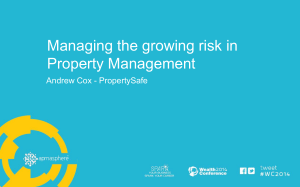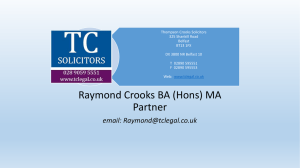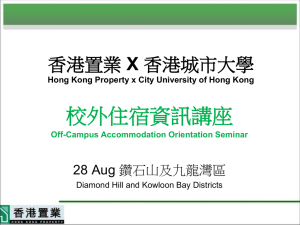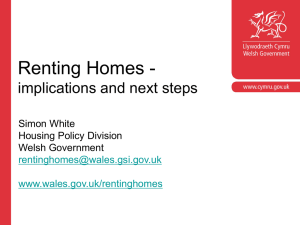landlord-guide-2015 - University of Gloucestershire
advertisement
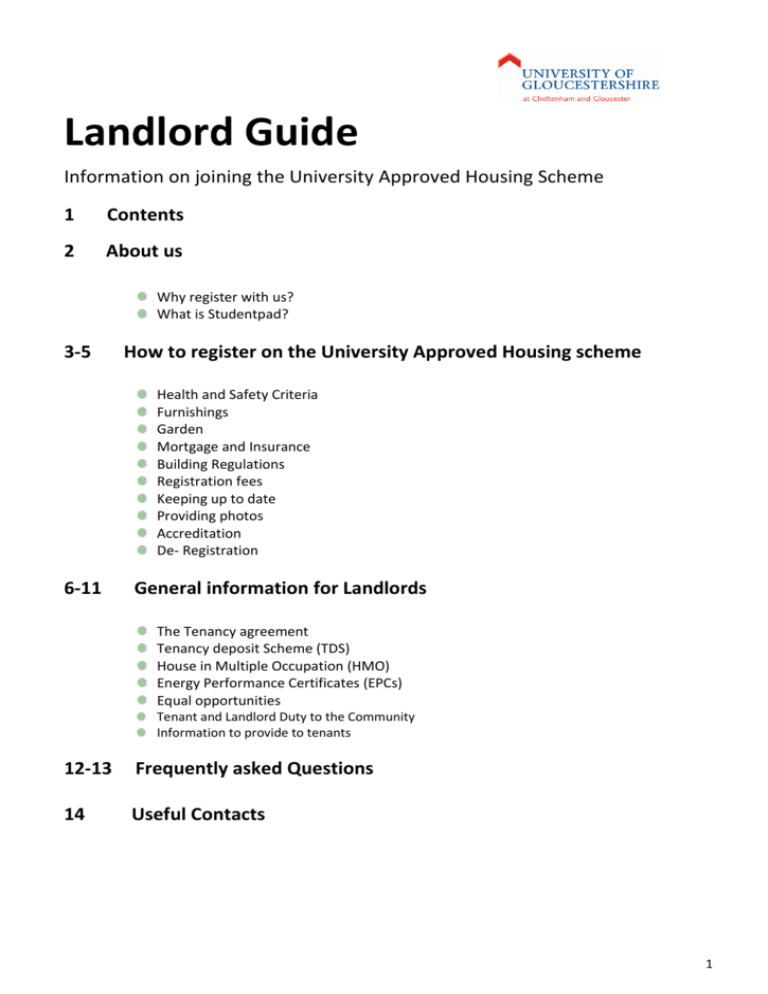
Landlord Guide Information on joining the University Approved Housing Scheme 1 Contents 2 About us Why register with us? What is Studentpad? 3-5 How to register on the University Approved Housing scheme Health and Safety Criteria Furnishings Garden Mortgage and Insurance Building Regulations Registration fees Keeping up to date Providing photos Accreditation De- Registration 6-11 General information for Landlords The Tenancy agreement Tenancy deposit Scheme (TDS) House in Multiple Occupation (HMO) Energy Performance Certificates (EPCs) Equal opportunities Tenant and Landlord Duty to the Community Information to provide to tenants 12-13 Frequently asked Questions 14 Useful Contacts 1 About us Welcome to the University of Gloucestershire’s Landlord Guide. The University’s Accommodation Department is based at Francis Close Hall Campus, Swindon Road, Cheltenham, Gloucestershire, GL50 4AZ. Tel: 01242 714544. The Housing Support Team is part of the Accommodation Department, we provide advice and support to students looking to find accommodation. We are here to meet the housing requirements and expectations of students, and introduce them to good quality local properties and run a University Approved Housing List to help them find the right housing. Why register with us? If you decide to register your property with the University of Gloucestershire you will be in the enviable position where every single student who studies with us will have access to view your property online at www.glosstudentpad.co.uk. No other local letting agency can boast a client base as extensive as this. We actively market our approved houses above any other private rentals. The University prides itself on offering good quality housing to its students. We aim to improve overall standards year on year. Security and comfort are key factors of a student’s accommodation requirements, it is essential that the student experience at University is a positive one. This booklet will inform you of how to register your property with the University of Gloucestershire Approved Housing Scheme and will also provide you with information on being a successful landlord. There are dedicated Housing Support Advisers who are able to offer advice and guidance on all issues relating to private let housing in Cheltenham and Gloucester. The Housing Support Team are able to act as mediators between landlords and tenants should any problems occur and are more than happy to help with any housing issues. What is Studentpad? Studentpad is the online search engine for University Approved properties available to University of Gloucestershire students, www.glosstudentpad.co.uk. Students looking for University approved shared houses can search for and locate properties on the website. When you join the University scheme your property will be advertised via this site. The site has proved very popular with the students, with 422,510 searches made by students in 2013/14. You will also be given details of how you can log in to the landlords view as well as view the search results as students will see them. There is an online user manual available to landlords when you logon to view your property(s) to help navigate your way around the site. The user manual also gives valuable information on how to conduct a tenancy. Once you have registered a property you can log in to the site and make changes, such as when the number of rooms to let changes. When you make amendments to adverts an email will be sent through to the Housing Support Team who will vet the changes and then make them live. If you would prefer changes to be administered by the Housing Support Team we are more than happy to help, simply email the amendments through to accommodation@glos.ac.uk. To register for the first time contact us on 01242 714544 or email accommodation@glos.ac.uk. 2 How to register on the University Approved Housing scheme The process: Completed application form is submitted. All relevant certificates and registration fees are sent (see below). Information received by Housing Support Team. Forms are processed and checks carried out to ensure all certificates and fees have been received. Visits carried out for any new properties. On confirmation that all documentation is up to date and correct, the property is approved for advertising. Further information sent to landlord regarding access to Studentpad . Your checklist: Complete an application form for each property to be registered. Provide all relevant documents (see guide and registration form) Send in the appropriate registration fee(s), see below. Please send in all the relevant paperwork electronically to accommodation@glos.ac.uk. A cheque for the fee(s) should be made payable to the University of Gloucestershire and sent to: Accommodation, Student Services, Bodley Building, Francis Close Hall, Cheltenham, GL50 4AZ. Health and Safety Criteria All properties must meet the compulsory criteria to become University Approved. Compulsory Health & Safety Criteria Landlord Gas Safety certificate, carried out by a CAPITA registered engineer; (this is a legal requirement). Electrical Safety report carried out by a qualified Electrician issued in accordance with BS7671. All pages of the certificate must be submitted. Mains interconnected smoke detectors installed on each floor in full working order and tested prior to the tenancy commencing. Confirmation of landlord’s public liability insurance, covering for a minimum of £2 million. Houses in Multiple Occupation (HMO) licence for the property (if applicable). Furniture and furnishings, including mattresses that are compliant with current fire safety regulations. A fire blanket in the kitchen. At least four electrical sockets in each study bedroom. Property should be in a good condition throughout. Desired Health & Safety Criteria No gas appliances in bedrooms or cupboards opening off bedrooms. If there are they must be enclosed in a cupboard with a carbon monoxide detector in the room. A battery/ mains carbon monoxide detector has been fitted. This should be in full working order when last checked and should be checked regularly and prior to a tenancy beginning. Yearly PAT testing of all electrical appliances. To be signed up to the Landlords Code of Conduct. Washing machine or plumbing for a washing machine is in place. Escape locks fitted to external doors. Being a member of the Fit to Rent Scheme or National Landlords Association Accreditation Scheme. 3 Furnishings All furnishings, flooring and decorations should be in a good clean condition with no tears or rips. Please be clear whether you provide internet access (student responsibility) or fully installed and operational internet/broadband. Garden It is recommended that the landlord/owner should maintain the garden. A suitable outdoor bin should be provided to dispose of household waste and avoid the attraction of vermin. Mortgage and Insurance The Accommodation Department recommends that you advise your mortgage and insurance providers of the use of the property. Building Regulations We would also advise Landlords/ Agents to be aware of Building regulations, these are legal requirements that need to be adhered to. These regulations apply to most type of buildings and relate to the technical aspects of construction and cover things like structural stability, fire resistance, means of escape, disabled access, weather resistance, thermal insulations and drainage. Landlords should ensure they are aware of these regulations when purchasing a student property to let. We would advise that Landlords/ Agents make themselves aware of the following website www.planningportal.gov.uk 4 Registration fees are as below; a separate form must be completed for every property registered. This may be subject to change. Number of properties registered 1-9 10-19 Registration fee per property £70 £50 20+ £30 Keep up to date It is vital that landlords keep the team up-to-date when their property(ies) become full so we are not advertising an out of date list and landlords are not receiving unwanted calls. The largest complaint that we receive from students is about the housing list being out of date. We ask that landlords do inform us when a property has been taken. Provide photos Students will often look at the adverts that have photos of the property first as they can see what it looks like before calling the landlord. Therefore, we would encourage all landlords to add photos to their adverts to give themselves the best chance of letting the property as early on as possible. We would advise that six good quality photographs are better than several smaller ones. If you would like to add photos please send them via email to accommodation@glos.ac.uk Accreditation The University of Gloucestershire is encouraging landlords to sign up to national and local accreditation schemes. If you are a member of the National Landlords Association (NLA) Accreditation Scheme or Gloucestershire’s Fit to Rent Scheme then we will highlight this on your property adverts and they will also have priority listing in search results. Details on these schemes can be found here: Council’s ‘Fit To Rent’ Scheme http://www.cotswold.gov.uk/nqcontent.cfm?a_id=13143 National Landlord’s Association Accreditation Scheme http://www.landlords.org.uk/support-advice/landlord-accreditation The University of Gloucestershire is committed to raising housing standards in Cheltenham and Gloucester and wants to recognise those landlords/ agents that work in partnership with us to ensure this happens. De- Registration The University reserves the right to de-register properties at any time. Below are examples of issues that could lead to de-registration. • Failing to meet the Health & Safety criteria • Falling below the compulsory standard during the academic year (including decor) • Privately advertising any properties in halls of residence and University grounds • Emailing students directly via their University email address without their permission • Poor conduct, including turning up unannounced, unfair contract terms, not protecting deposits • Letting unregistered properties through enquiries about registered properties on Studentpad. 5 General information for Landlords The Tenancy agreement When you are letting rooms in a property you will automatically be creating an agreement between yourself (the landlord) and the tenant. An assured short hold tenancy (AST) is the usual form of letting if: • The tenancy began on or after 15 January 1989; • The house or flat is let as separate accommodation By giving someone a tenancy agreement you are giving them the right to use the property. As a tenant they have the right to quiet enjoyment and should be given at least 24 hours written notice before visiting, unless there is an emergency. Once a tenant has signed a tenancy agreement they are tied into the agreement for the term stated. It is usual with a student that the tenancy runs for an academic year. A landlord can only seek possession during a fixed term tenancy if one or more of the conditions of tenancy are breached and would have to be granted by order of the courts. Tenancy agreements should be clear and concise and written in plain English with no jargon. We would advise that you purchase a tenancy from a stationer or you can download them from the web. You may want to look at www.landlords.org.uk which gives valuable advice. Rent Rent should include water rates. Tenants usually pay for the other utilities, gas, electricity and telephone. If you do want to set up an inclusive rent you may want to cap the amount. This should be clearly stated in the tenancy agreement and explained to the tenants clearly. Tenant responsibilities The University tries to ensure that every student is informed of their responsibilities as a tenant. • paying the rent on time • informing the landlord if any repairs are needed • using the property in a responsible manner and avoiding damage • not causing a nuisance to neighbours or other occupants • securing the property when it is empty • undertaking minor maintenance, e.g. unblocking sinks, replacing light bulbs, general cleaning • students should ensure that their rubbish is kept in a suitable bin and put out for collection on the correct day The University makes every effort to ensure students understand their responsibilities when living in the local community, the following advice is given when they move into their home: • Students should introduce themselves to their neighbours when they move in, to encourage strong community spirit 6 • Students are asked to keep the noise down between 11.00pm – 8.00am to avoid any unnecessary problems occurring • Students must think about their behaviour whether in or out of the University as their actions will have consequences for both. Landlord responsibilities • Landlords should adhere to their tenancy agreements. • Landlords should ensure that their properties are maintained throughout the tenancy. • Priority should be given to failures in heating and hot water systems. • Landlords, tradesmen or other official personnel should not enter the tenants home without due notice. • Landlords should provide all equipment enabling tenants to conduct their tenancies in an appropriate manner. • Landlords should be responsible for the repairs to the structure and all fixtures and fittings of the dwelling, including heating and hot water installations. It would be beneficial for landlords to check that all tenants are full-time students at the University of Gloucestershire. Council tax exemptions are only applicable for properties that are solely occupied by students in full-time education. Landlords must ensure they adhere to council/ government guidelines on: • Tenancy Deposit Scheme • House in Multiple Occupation • Energy Performance Certificates Supporting information on these regulations can be found on pages 8-10. Inventory It is advisable to create an inventory that lists the contents of the property and their condition. We would advise students to complete an inventory themselves if a landlord has failed to do so. The details of which should be agreed by all parties. Retainers A retaining fee over the summer period can be requested if the tenants currently living in the property wish to reserve it for the forthcoming year. A retaining fee should not be expected from tenants who have not yet moved into the property. 7 Tenancy Deposit Scheme (TDS) From 6 April 2007, all deposits taken by landlords using an Assured Shorthold Tenancy (AST) in England and Wales must be covered by a government backed tenancy deposit protection scheme. What are tenancy deposit schemes? There are two types of tenancy deposit protection schemes available for landlords and letting agents (insurance based schemes and custodial schemes). Any landlord can use the custodial scheme but there are some restrictions on who can use the insurance based schemes. All schemes provide a free dispute resolution service. Tenancy deposit schemes ensure that deposits paid to the landlord are kept safe and a tenant gets their deposit back at the end of the tenancy, as long as there has not been a breach of the tenancy. These breaches could be such things as unpaid rent, cleaning or damage to the property. Custodial Scheme The Deposit Protection Service (DPS) provides the only custodial TDP Scheme. Under this scheme the DPS holds the deposit money in the bank account. When the tenancy ends, it releases the deposit to the person who is entitled to it. Insurance Based Schemes The landlord or the landlord’s agent holds the tenant’s deposit and pays a fee to insure it. If the landlord doesn’t pay the tenant the amount they are owed at the end of tenancy, the insurer will pay the tenant and try to get the money back from the landlord. The only two insurance based providers at present are MyDeposits and the Tenancy Deposit Scheme (TDS). There is no charge for landlords or letting agents to use the custodial DPS. The insurance based schemes charge a fee for membership and you will also have to pay insurances premiums. The schemes allow tenants to get all or part of their deposit back when they are entitled to it and encourage tenants and landlords to make a clear agreement from the start on the condition of the property. Further information can be found at https://www.gov.uk/tenancy-deposit-protection 8 House in Multiple Occupation (HMO) Please ensure that you check with the council as to whether your property requires an HMO licence. HMO generally refers to one of the following: • A house split into bedsits • A house or flat share where each tenant has their own tenancy agreement • Students living in shared accommodation Does my HMO need a license? On April 6th 2006 mandatory HMO licensing came into force across England with the intention of raising the standard of accommodation in HMOs. Landlords must register their HMO with the council if the property has 3 (habitable) storeys or more AND is occupied by 5 or more people in one household. The council will then assess whether (in their view) there is enough space for the occupants and if the property is well managed before granting a license. Councils also have power to introduce licensing for smaller HMOs or all rental properties in certain areas they want to improve, so always check with your local council to see what regulations apply. What is the license? The license will specify the maximum number of people who may live in the HMO. It will also include the following conditions, which apply to every license: • A valid current gas safety certificate, which is renewed annually, must be provided • Proof that all electrical appliances and furniture are kept in a safe condition • Proof that all smoke alarms are correctly positioned and installed • Each occupier must have a written statement of the terms on which they occupy the property, for example, a tenancy agreement Councils may also apply the following conditions: • Restrictions or prohibitions on the use of parts of the HMO by occupants. • A requirement that the condition of the property, its content, such as furniture and all facilities, bathroom and toilets for example, are in good working order. Please note that licensing only applies to HMOs where rents or other considerations are payable. The information contained in this guide is intended to get you acquainted with the background to HMOs. As local councils have the authority to impose licensing as they see fit we strongly suggest you speak to your council for further clarification. Please refer to the following website http://www.cheltenham.gov.uk/downloads/898/licence-homes_in_multiple_occupancy 9 Energy Performance Certificates (EPCs) It is mandatory for landlords to have a valid energy performance certificate (EPC) available for all new tenants, highlighting the property’s energy efficiency and its environmental impact, along with providing estimated running costs and recommendations for improving the home’s performance. A certificate will be required for any property that is let on a shared basis regardless of whether it is a joint or sole tenancy agreement. Certificates will be valid for ten years. EPCs must be produced by an accredited Energy Assessor. If you use an Independent Energy Assessor, make sure they are a current member of an accreditation scheme https://www.epcregister.com/ Further information is available at https://www.gov.uk/government/publications/energy-performancecertificates-epcs-and-renting-homes-a-landlords-guide If you are letting out a room in your own home, i.e. lodgings, you may be exempt from this regulation. Equal opportunities We are committed to being a community where equality of opportunity is a reality for all students and staff. That means creating a positive environment in which students and staff are respected. We aim to ensure that no-one in our university community will receive unfair or unlawful treatment due to race, colour, nationality, ethnic or national origins, religion, creed, sex, sexual orientation, marital status, disability or age. Landlords must therefore ensure that there is no discrimination in the provision and letting of accommodation and that all tenants are treated respectfully and fairly. Under the Race Relations Act and the Sex Discrimination Act it is unlawful to discriminate on the basis of race or sex. Failure to comply with the university’s commitment to equal opportunities may result in owners / landlords being removed from the accommodation register. 10 Tenant and Landlord Duty to the Community If a noise complaint is received by the University, the landlord will be contacted and asked to speak with the tenants. Contractually the landlord is obliged to address such complaints. The University takes noise complaints and other disturbances very seriously and will visit and write to the students if such a complaint occurs, this does not release a landlord from their obligation to the community. The University works closely with the local council, community groups and the police to try and ensure the students settle into the community well. We would ask landlords to work with us to achieve this aim. The Housing Support Team is here to offer advice and support to any landlord that may be facing noise disturbance issues or other problems with students and will help to deal with these issues quickly. Information to provide to tenants Recycling Students should be encouraged to recycle items at their local recycling centres throughout the year and especially when they are moving out in the summer, instead of putting large amounts of refuse out on the streets for collection. Security In the present climate of opportunist thieves, local police recommend that owners of student properties should take adequate precautions to secure against break-ins. For advice, refer to www.homeoffice.gov.uk/crime/ Notices We would advise that the following information is displayed at all times in the property: • Name, address and telephone number of the landlord/agent of the property • Emergency repairs procedure/telephone numbers • Procedures in case of fire • Location of water stop-cock, mains gas tap and electrical trip switch • Copies of the gas, electrical certificates and HMO license if applicable • Information of refuse and recycling collection days TV Licence • If your tenants have a television they will require a TV licence; please refer to the website for current regulations. • Each tenant who signs a sole tenancy and watches a television in their bedroom will need a licence. Further information can be found at www.tvlicensing.co.uk 11 Frequently asked Questions What do I get for my money? The registration fee covers the administration of putting your property on Studentpad, advertising throughout the year, visits when necessary and ongoing communication. We can also liaise with all parties with regards to any tenancy issues that may occur. When can I register a property with the University, is it only once a year? You can register anytime during the year as long as you have met the current criteria and have provided all relevant documentation. Please note it can be very busy the two weeks prior to the housing list being released. What condition should my property be in before it can be registered? All properties need to meet the compulsory criteria when registered with us. We can only advertise a property when it has been furnished and decorated and all certification has been received. We expect properties to be in a good state of repair, both the building and contents supplied to tenants. Paintwork should be clean and not peeling, carpets should not be ripped and all furnishings should be clean and whole. Housing Support Advisers have the right to refuse to register a property. Are you open during the University holidays? We are open throughout the year only closing for University and Bank Holidays. The office is open from 8.30am – 5.00pm, Monday – Thursday and 4.30pm on Fridays. Do I have to use a tenancy deposit scheme? Yes, from the 6th April 2007 all landlords that give assured shorthold tenancy agreements now have to register deposits with one of the schemes, this is a legal requirement. If the deposits are not protected in a tenancy deposit scheme, landlords can face large fines or prosecution. What if I offer an inclusive rent? You should make tenants aware of how many units used for gas and/or electricity you have budgeted for within your inclusive rent. This should be included in your tenancy agreement. Because of the price increases in utility bills over the last few years we would advise you to put a cap on the amount that can be used. What is an Erasmus student? Erasmus students are international exchange students who may only study at the University for one semester. If renting to Erasmus students you may to need to provide a shorter tenancy agreement. Should I have the student’s home details? It is important that you have the tenant’s home address in case a problem arises either during or after the tenancy period. Are there any precautions I should take in my property? We suggest that loft hatches and cellars are locked to avoid tenants using them for storage. Banisters should be fitted correctly and there should be no trip hazards, e.g. trailing wires and carpets that are not fixed properly. Should I provide any information in the property? We suggest that you have a copy of your current certificates displayed along with a list of emergency contact details. It is also useful to state where the stopcock and trip switch are located and their refuse collection day. 12 What is an Inventory? The inventory should include everything that is in the property as well as the condition of the house including any marks on carpets, walls etc. It should be signed and dated by both the landlord and all the tenants. This is important to avoid disputes at the end of the tenancy. What should happen at the end of the tenancy? A visit should be made to the property by both the landlord and tenants before the end of the tenancy to ensure the property is in good order and to avoid any unnecessary disputes over the deposit. Meter readings should be taken and any tenant post redirected. How long should a tenancy agreement be? We advise our students to look for tenancy agreements that cover the academic year, this can be anything from 38 to 42 weeks. Should we contact the parents/guardian if a student is not paying their rent? No, where tenants are over 18 parents should not be contacted for rent unless the landlord has a guarantor form and the parents are named on it. I would like a letting agent to manage my property, can I do this? Yes, however we would want confirmation that there would be no ‘hidden’ costs passed onto the tenant and the owner was the landlord not the letting agent. The University has the right to refuse any letting agents. What is a guarantor? A guarantor will guarantee payment of rent that has not been paid by the tenant. More and more landlords are choosing to use them. 13 Useful Contacts Accommodation Office Francis Close Hall Swindon Road Cheltenham, GL50 4AZ Tel: 01242 714544 Email: accommodation@glos.ac.uk Web: www.glos.ac.uk/accommodation National Landlords Association 22-26 Albert Embankment London SE1 7TJ Tel: 020 7840 8900 Web: www.landlords.org.uk Email info@landlords.org.uk Cheltenham Borough Council Municipal Offices Promenade Cheltenham, GL50 9SA Tel: 01242 262626 Fax: 01242 227131 Minicom: 01242 264264 Email: enquiries@cheltenham.gov.uk Web: www.cheltenham.gov.uk Gloucester City Council Herbert Warehouse The Docks Gloucester GL1 2EQ Tel: 01452 396396 Email: heretohelp@gloucester.gov.uk Council Tax Tel: 01242 264161 Email: counciltax@cheltenham.gov.uk Council Tax Gloucester City Council Revenues Services Tel: 01452 396495 Email: revenues@gloucester.gov.uk Environmental Health Tel: 01242 264135 Email: envhealth@cheltenham.gov.uk Environmental Health Tel: 01452 396396 Email: heretohelp@gloucester.gov.uk Fax: 01452 396340 Fit to Rent Scheme (Cheltenham) Cheltenham Borough Council Private Sector Housing Tel: 01242 775008 enquiries@cheltenham.gov.uk Fit to Rent (Gloucester) Gloucester City Council Environmental Health Tel: 01452 396396 fittorentlandlords@gloucester.gov.uk Citizens Advice Bureau (CAB Cheltenham) 6 St James Square Cheltenham GL50 3PR Tel: 01242 522491 Fax: 01242 531380 Web: www.cheltenhamcab.org.uk Email: advice@cheltenhamcab.org.uk Citizens Advice Bureau (Gloucester) 75-81, Eastgate St, Gloucester GL1 1PN Tel: 01452 527202/01452 528017 Web: www.gloucestercab.org.uk Email: bureau@gloucestercab.cabnet.org.uk Victim Support Tel: 0845 3030900 Web: www.victimsupport.org.uk Police Tel: 999 Non-emergency Tel: 101 Web: www.gloucestershire.police.uk Crime Stoppers Crime & Victims www.gov.uk/your-rights-after-crime Tel: 0800 555 111 14
